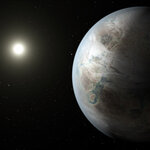This is just a fun question someone asked on Quora. It leads into a few interesting topics. First the ISS just isn't heavy enough for a satellite to enter into a true gravitational orbit around it. But, in theory at least, you can put a satellite into a temporary orbit that looks from the point of view of the ISS as if it is in orbit around it.
For a while. It's not kept in place by any gravitational attraction to the ISS, so it is sort of an illusory orbit you could say in a way - but perhaps it is interesting.
ORBITING THE ISS BY COINCIDENCE
The trick is to put it into an…
Space

We know that our universe has already lived through great number of exciting phases.
But new research released overnight shows the universe has long passed its peak and is slowly but surely dying.
The research was presented at the year’s largest gathering of astronomers at the International Astronomical Union’s General Assembly in Hawaii.
Before we start writing any obituaries, let’s have a quick recap of the good times.
When the universe was less than a second old and more than a billion degrees Celsius, it was hot enough for exotic particles to freely pop in and out of existence.
As the…
Most people, when they think about exploring the galaxy, think about sending out human colonies. It's natural to think we would explore it just as we do the Earth, it's the only way we know. To send machines instead of humans, especially machines that can replicate, may seem frightening. But - I'd argue, humans colonies are by far the most scary way we could explore the galaxy. It might well be a case of "look out galaxy (and Earth), the monsters are coming" :).
So what can we do? What is a responsible way to explore our galaxy, with current understanding of science, biology, and…
Most people, when they think about exploring the galaxy, think about sending out human colonies. It's natural to think we would explore it just as we do the Earth, it's the only way we know. And to send machines instead of humans, especially machines that can replicate, seems frightening. But - I'd argue instead, humans colonies are by far the most scary way we could explore the galaxy. At least at the current state of understanding of science, biology and society, it might well be a case of "look out galaxy, and Earth also, the monsters are coming" :).
So what can we do? What is a…

Prolonged spaceflight may give you a nasty case of diarrhea, at least if you are a mouse. Specifically, when mice were subjected to simulated spaceflight conditions, the balance of bacteria and the function of immune cells in the gut changed, leading to increased bowel inflammation.
To make their discovery, researchers used four groups of mice. The first and third groups were suspended for 14 days by the tail at a 15 degree head-down tilt with their hindlimbs suspended. Access to food and water was ensured using both water bottles and gel packs and food distributed around the floor of…

What do you say to Pluto’s demotion to “dwarf planet” status? I did not approve of the demotion, but a few days ago our BBC Sky at Night team did give a reasonable reason why it does require a new category. With Neptune, one can say “planets end here”, while Pluto is the first of many bodies such as the remarkable Eris that we now know inhabit the Kuiper Belt. But while, to quote, Pluto does not meet the definition of a planet but as we will see that does not diminish it, I do think a nicer term than “dwarf planet” should be invented. “Planet” means “wanderer” in…

NASA’s announcement of the discovery of a new extrasolar planet has been met with a lot of excitement.
But the truth is that it is impossible to judge whether it is similar to Earth with the few parameters we have – it might just as well resemble Venus, or something entirely different.
The planet, Kepler-452b, was detected by the Kepler telescope, which looks for small dips in a star’s brightness as planets pass across its surface. It is a method that measures the planet’s size, but not its mass. Conditions on Kepler-452b are therefore entirely estimated from just two data points: the…
There is so much over enthusiastic hype about this planet today, I thought could do with a bit of more sober reporting of the results, interesting though they are. Much of that speculation derives from just one phrase in the press release I think, where they say: "Today, and thousands of discoveries later, astronomers are on the cusp of finding something people have dreamed about for thousands of years -- another Earth." The idea of what that means by "another Earth" for astronomers who know the capabilities of Kepler, is rather different from what most of the general public…

Galaxies in a cluster roughly 300 million light years from Earth could contain as much as 100 times more dark matter than visible matter, according to an Australian study. The research used computer simulations to study galaxies that have fallen into the Coma Cluster, one of the largest structures in the Universe in which thousands of galaxies are bound together by gravity.
"It found the galaxies could have fallen into the cluster as early as seven billion years ago, which, if our current theories of galaxies evolution are correct, suggests they must have lots of dark matter protecting the…

A type of two-star system known as a Cataclysmic Variable, where one super dense white dwarf star is stealing gas from its companion star, effectively 'cannibalizing' it, has been found by citizen scientists. It is the first known such system where one star completely eclipses the other.
The system, named Gaia14aae, is located about 730 light years away in the Draco constellation. Amateurs discovered it in data from the European Space Agency's Gaia satellite of August 2014, when it suddenly became five times brighter over the course of a single day.
Astronomers then analyzed the…